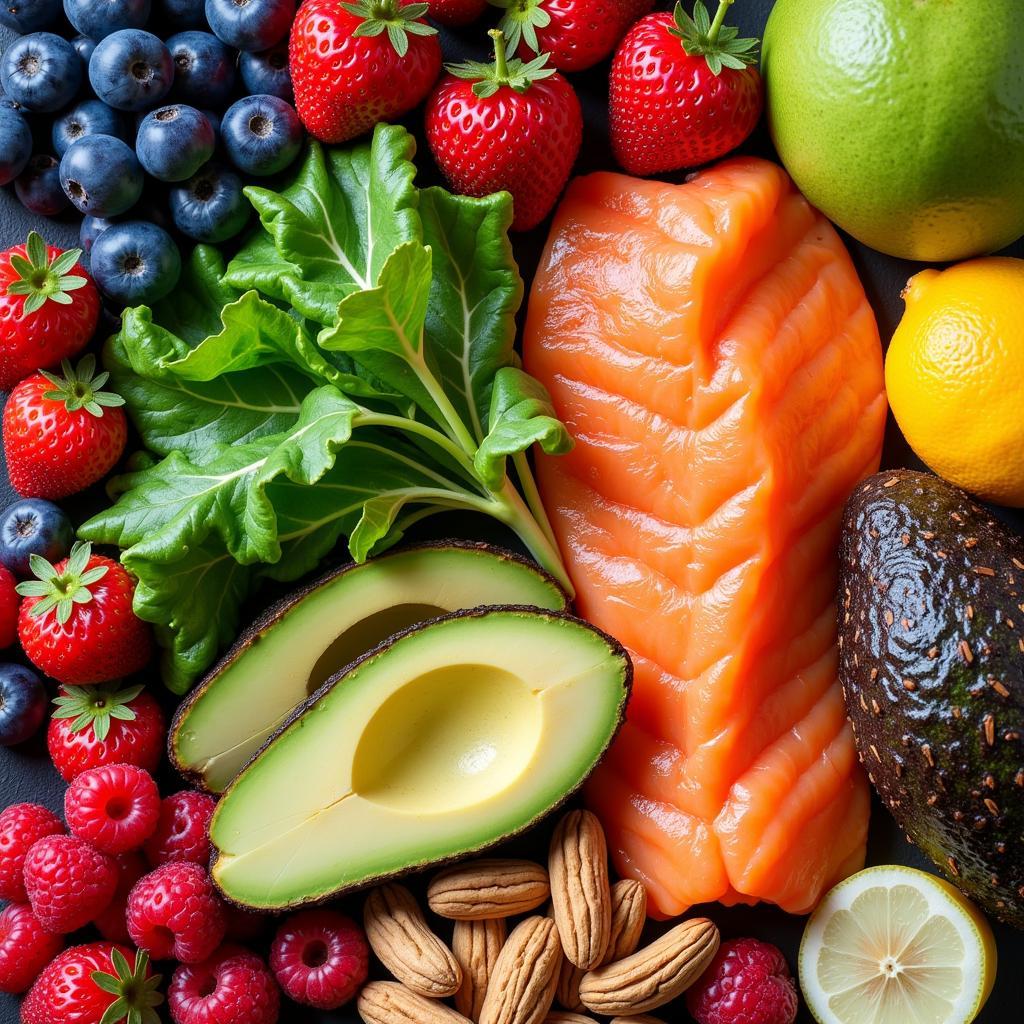The Mito Food Plan is gaining popularity, and understanding the Mito Food Plan Food List is crucial for reaping its potential benefits. This guide provides a comprehensive overview of the Mito Food Plan, diving deep into its food list, benefits, and potential drawbacks.
Understanding the Mito Food Plan
The Mito Food Plan focuses on supporting mitochondrial health, the powerhouses of our cells. By nourishing these energy-producing organelles, the plan aims to improve overall energy levels, cognitive function, and even slow down the aging process. It emphasizes nutrient-dense foods while limiting those that may hinder mitochondrial function.
Decoding the Mito Food Plan Food List
What can you eat on the Mito Food Plan? The food list is surprisingly diverse and delicious! It’s built around fresh, whole foods that are rich in antioxidants and essential nutrients.
- Fruits and Vegetables: Colorful berries, leafy greens, cruciferous vegetables, and sulfur-rich vegetables like broccoli and onions are encouraged. They provide a wealth of antioxidants and phytonutrients that protect mitochondria from damage.
- Healthy Fats: Avocado, olive oil, nuts, and seeds are excellent sources of healthy fats that support mitochondrial membrane health.
- Lean Protein: Fish, poultry, and lean meats are included in moderation. Focus on grass-fed and organic options whenever possible.
- Whole Grains (Limited): The Mito Food Plan generally limits grains, but some pseudo-grains like quinoa and buckwheat can be included occasionally.
 Mito Food Plan Approved Foods
Mito Food Plan Approved Foods
What should you avoid? The Mito Food Plan restricts foods that can potentially stress mitochondria.
- Processed Foods: Say goodbye to sugary drinks, refined grains, and processed meats. These foods lack nutritional value and can generate free radicals that damage mitochondria.
- Excessive Sugar: Sugar can disrupt mitochondrial function and contribute to oxidative stress.
- Artificial Sweeteners: While seemingly a healthier alternative to sugar, artificial sweeteners can negatively impact gut health, which indirectly affects mitochondrial function.
- Industrial Seed Oils: These oils, often found in processed foods, are highly inflammatory and can damage mitochondrial membranes.
Benefits of the Mito Food Plan
Following the Mito Food Plan can lead to a range of health benefits:
- Increased Energy Levels: By optimizing mitochondrial function, the plan can naturally boost your energy levels throughout the day.
- Improved Cognitive Function: Mitochondria play a crucial role in brain health, and the Mito Food Plan supports optimal cognitive performance.
- Reduced Inflammation: The emphasis on whole, unprocessed foods can help reduce chronic inflammation, a major contributor to many health issues.
Potential Drawbacks and Considerations
While generally safe, the Mito Food Plan may not be suitable for everyone.
- Restrictive Nature: The elimination of certain food groups can be challenging for some individuals to maintain long-term.
- Potential Nutrient Deficiencies: Careful planning is crucial to ensure you’re getting all the necessary nutrients while following the restrictive aspects of the plan. Consulting with a registered dietitian or nutritionist is recommended, especially if you have any underlying health conditions.
Is the Mito Food Plan Right for You?
The Mito Food Plan offers a promising approach to improving overall health by supporting mitochondrial function. However, its restrictive nature requires careful consideration and planning. If you’re looking to boost your energy, improve cognitive function, and reduce inflammation, the Mito Food Plan might be worth exploring.
Conclusion
The mito food plan food list provides a framework for nourishing your mitochondria and optimizing your health. By understanding the foods to include and avoid, you can harness the potential benefits of this dietary approach. Remember to consult with a healthcare professional before making significant dietary changes, especially if you have pre-existing conditions.
FAQ
- What is the main goal of the Mito Food Plan? (To support mitochondrial health and function)
- What are some key foods to include in the Mito Food Plan? (Berries, leafy greens, avocado, nuts, seeds, lean protein)
- What foods should be avoided on the Mito Food Plan? (Processed foods, excessive sugar, artificial sweeteners, industrial seed oils)
- Can the Mito Food Plan improve energy levels? (Yes, by optimizing mitochondrial function, the plan can naturally boost energy.)
- Is the Mito Food Plan suitable for everyone? (While generally safe, it’s important to consult a healthcare professional before making significant dietary changes.)
- Are there any potential drawbacks to the Mito Food Plan? (The restrictive nature and potential nutrient deficiencies if not planned carefully.)
- Where can I find more information about the Mito Food Plan? (Consult with a registered dietitian or nutritionist for personalized guidance.)
Need support? Contact us at Phone Number: 02437655121, Email: [email protected] or visit us at 3PGH+8R9, ĐT70A, thôn Trung, Bắc Từ Liêm, Hà Nội, Việt Nam. We have a 24/7 customer support team.